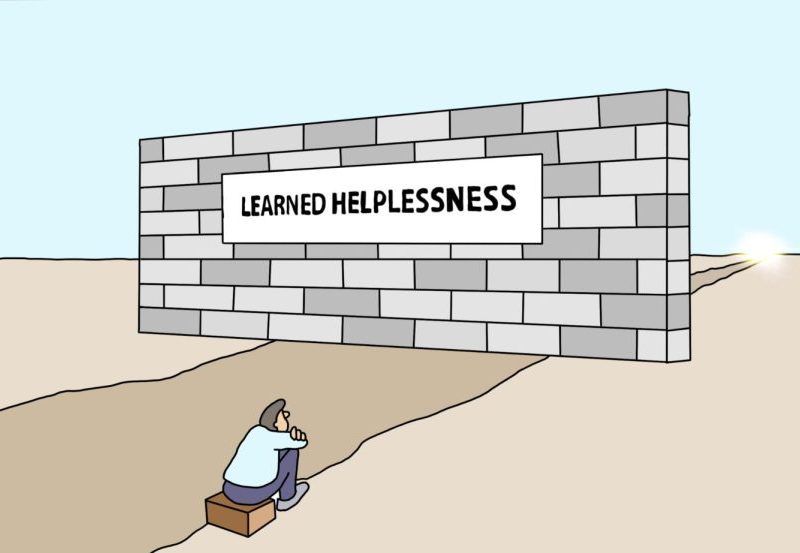In a village in Africa, where young boys like Kofi, a bright, energetic, and full of dreams of making a better life for himself and his family lives. It isn’t out of place to experience growing up in an environment plagued by poverty, corruption, and political instability, Kofi will face numerous obstacles that seemed insurmountable every time he tries.
From a young age, Kofi must have witnessed his parents struggling to make ends meet, unable to access basic necessities like clean water, education, and healthcare. As he grew older, Kofi’s dreams of becoming a doctor, an engineer, or a pilot began to fade as he realized the harsh realities of his surroundings full of blockages of an environment far from enabling.
Despite his best efforts to excel in school and pursue opportunities for advancement, he felt trapped in a cycle of learned helplessness. He saw friends and neighbours resigning themselves to fate, believing that nothing they did would ever change their circumstances. As a result, Kofi’s motivation waned, and he found himself succumbing to the same sense of hopelessness.
The concept of learned helplessness cannot just be limited to individuals like Kofi; it permeates society at large, contributing to economic stagnation, social inequality, and political inertia. Corruption and mismanagement by government officials further exacerbated this problem, eroding trust in institutions and reinforcing the belief that nothing could be done to improve any situation by whatsoever means. It’s as though we better keep quiet than venture on a mission that seems to bring more pain and hardship.
In the printing industry raw materials remains a candidate for import, the exchange rate being a major factor in determining the fate of production cost across the sector, as the exchange rates continue to sour, we also see practitioners resigning to fate. If we increase price further, we lose the remaining patronage. We have a bank loan to service, in fact to curb inflation our economic experts have recommended an increase in those banks interest rate, “at all at all na him bad”, we will rather sell below cost price than not repay some debt. Truth be told majority has switched to “Learned Helplessness”.
This indeed is a psychological phenomenon where individuals learn to believe they have no control over their circumstances, leading them to give up trying to change or improve their situation, even when opportunities for change are present. This concept has been studied extensively in psychology, particularly in the context of motivation, resilience, and depression.
The psychological perspective on giving up can vary depending on various school of thought; From a cognitive-behavioral perspective, giving up might be seen as a learned response to perceived numerous failures or obstacles, which can be addressed through cognitive restructuring and behaviour modification techniques that we most times don’t even have any energy to explore.
From a humanistic perspective, giving up might be viewed as a loss of motivation or a disconnect from one’s true desires and values, emphasizing the importance of self-awareness and personal growth to regain a sense of purpose.
While Psychodynamic perspectives might explore the underlying unconscious conflicts or defense mechanisms that contribute to the feeling of giving up, with a focus on resolving internal conflicts through insight-oriented therapy.
Overall, the approach to understanding and addressing giving up behaviour can vary depending on the theoretical framework and the individual’s unique circumstances and needs.
Majority of our young Printing community have relocated abroad, and many are still on the pathway of doing same. We would be living in denial if we think not doing something about this trend would not dramatically affect the succession planning of our various printing business empires. Hence the need to understand that psychologically a natural response to escape learned helplessness is to move to a more enabling environment, especially when these individual feels trapped in adverse conditions with limited opportunities for improvements. Research on the psychological impact of migration often explores the resilience and coping mechanisms of migrants. While not directly addressing learned helplessness, this body of work sheds light on how individuals adapt to new environments and navigate the challenges of uprooting their lives, a process that can be seen as a rejection of helplessness and a pursuit of empowerment.
However, for those not migrating, amidst the despair, there are always glimmers of hope here and there. Organizations and individuals dedicated to empowering communities must begin to emerge, offering education, training, and support to help break the cycle of learned helplessness. Grassroots movements must snap out and allow advocating for transparency, accountability, and good governance gain momentum, we must start to demand change from the bottom up for a change, it is obvious that change won’t start from the top so the grassroots must start exhibiting the changes they would like to see.
To snap out of this situation and pave the way for a brighter future, the printing industry and indeed Africa as a whole need a multi-faceted approach that addresses both the structural and psychological barriers to progress. Here are some solutions:
- Education and Skills Development: Investing in quality education and vocational training programs to equip young people like Kofi with the skills they need to thrive in the modern economy is indeed a game changer for building the intellectual muscle needed to unlearn helplessness.
- Empowerment and Community Engagement: Foster a sense of agency and empowerment among individuals and communities by involving them in decision-making processes and providing opportunities for active participation in governance and development initiatives. Those who are well to do in our printing community need to take up massive mentoring laced with empowerment programs otherwise getting reliable work force will continue to be as difficult as the camel passing through the need eye as potential work force would rather take up miniature jobs abroad.
- Strengthening Institutions: We all need to decide on the positives of combating corruption and improved governance by strengthening institutions, promoting transparency, and holding leaders accountable for their actions and also inaction.
- Printing Economic Diversification and awakening of massive Entrepreneurship: Encourage economic diversification and entrepreneurship by creating an enabling environment for small businesses, fostering innovation, activating a foundation to reward research and development, and providing access to finance and intentionally building market opportunities. Printing can definitely feed other striving businesses…
- Mental Health and Psychosocial Support: Recognizing the impact of learned helplessness on mental health and well-being and provide psychosocial support services to help individuals overcome feelings of hopelessness and despair. Religious organization can also do better in preaching hope and joining force with institutions to create a support system.
By addressing the root causes of learned helplessness and empowering individuals and communities to take control of their own destinies, Africa can break free from the cycle of poverty and realize its full potential as a continent of opportunity and prosperity. For instance the Nigeria printing stakeholder can research, develop and engineer the modular paper mills booming abroad, we can export prints to earn forex, we can print eye catching packages for a lot of our local products for export – our shear butter is one of the best in the world which can fuel cosmetic products and the same with our cocoa to rival Belgium chocolates, do we have time to explore how African textile prints can become a forex revenue generator? Or how our suya, kilishi, kunu and zobo can be packaged as delicacies for the high and mighty both home and abroad.
Ladies and gentlemen, young or old, male or female, tough people are the ones that last, switch on some “innovation mindset” or “growth mindset.” These concepts emphasize the belief that abilities and intelligence can be developed through dedication and hard work, rather than being fixed traits. Those with an innovation mindset are more likely to embrace challenges, persist in the face of setbacks, and see failures as opportunities for growth rather than signs of incompetence.
Who is joining on a mission critical trip of unlearning helplessness?




